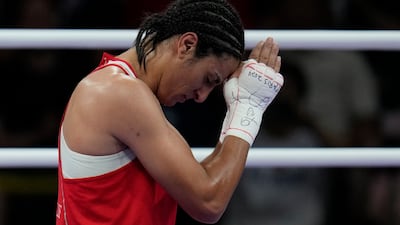The Paris Olympics are coming to an end on Sunday. And while many athletes will return home with an overwhelming feeling of accomplishment and pride, for some female Arab athletes, the feelings may be more mixed. They have had to defend themselves over the past fortnight against undue scrutiny and social media bullying – not because of their athletic performance, but because of their womanhood.
The high-profile mistreatment of Algerian boxer Imane Khelif is the case in point. Khelif's emotional journey during the Olympics captured the attention of millions. After her victory over Hungarian boxer Luca Anna Hamori, she tearfully declared, “I’m a woman,” in response to the harsh commentary questioning her gender. The wave of online hate and bullying she faced, with cruel accusations about her identity based solely on her build, reflects a broader societal bias against women athletes who do not conform to traditional feminine ideals.
And it is worth noting that these biases, in Khelif’s case, came primarily from the West – not the Middle East and North Africa. The boxer was misgendered by former US president Donald Trump as well as his running mate, who exploited the controversy around her to reinforce talking points about gender and sport. She was misgendered by French politician Marine Le Pen and British author JK Rowling, too, and shamed by Italian Prime Minister Giorgia Meloni, who implied on social media that an Italian boxer’s bout with Khelif was unfair.
All of this was even more galling in an Olympic Games whose opening ceremony drew controversy for its French organisers’ efforts to bend traditional gender norms. At the same time, France’s decision to ban its own Muslim athletes from wearing the hijab has put them in an especially vulnerable position, caught between their personal circumstances and state and societal pressure.
As Khelif herself put it, this bullying “harms human dignity” and has to stop.
Ilona Maher, a US rugby player, has faced a similar experience. Maher helped her team secure a bronze medal, but was nonetheless criticised by some in the US for her outspoken advocacy of body positivity and desire to challenge traditional beauty standards in sports. Some questioned Maher's femininity based on her muscular build.
One cannot help but wonder if male athletes, or white European athletes, would attract the same level of negative attention. The Dutch Olympic team drew some controversy at the start of the Games for including on its men’s volleyball squad a convicted child rapist, but that case has received nowhere near the amount of press – or comments from politicians – as Khelif’s. It seems somewhat acceptable in many circles to attack an Arab woman, using her case as a hate advertisement to gain traction from conservatives for casting ballots.
Khelif's experience highlights the intersection of race and gender. As an Algerian woman competing in a predominantly western-influenced event, she faced unique challenges. The racialised lens through which her body was viewed further marginalised her achievements and reinforced stereotypes about Arab women. Instead of championing diversity, the Paris Olympics experience revealed deep-seated biases that continue to affect women from Eastern cultures.
Much of the commentary has also demonstrated a chauvinistic attitude towards women. It is not about protecting women in sports, or protecting women from oppression, it is about dictating how women should appear and behave according to western standards.
Arab women athletes don’t need to be "saved" from their own choices, or appearance, western politicians need to stop imposing gender norms that their countries claim to oppose.
There is enough pressure, for many of these athletes, coming from relatively conservative corners in their home countries without being drawn into the West’s culture wars. Egyptian fencer Nada Hafez, who competed while seven months pregnant, was scrutinised not for her athletic prowess but for her decision to compete during her pregnancy. Similarly, Egyptian boxer Yomna Ayyad was disqualified for not meeting the weight requirement, with her own coach attributing this to "emotional and physiological changes that all women experience”, presumably meaning her menstrual cycle.
The cultural reluctance to accept women in non-traditional forms and roles sends a discouraging message to young girls that sports are not for them and that they must choose between being an athlete and being a woman who does not fit pre-determined norms.

On the bright side, Arab women like Khelif, Hafez and Ayyad, along with many others – Oumaima El Bouchti of Morroco, Marwa Bouzayani from Tunisia, Safia Al Sayegh of the UAE, Palestinian swimmer Valerie Tarazi – showcased remarkable commitment during the Olympics. Other Arab female athletes have, too. Ayesha Al Balooshi’s participation in judo, Fatima Al Ali’s representation in track and field events highlights the UAE’s investment in nurturing young talent across various sports. Meanwhile, Saudi Arabia’s Yasmine Al Dabbagh, Huda Al-Shahrani, Dunya Abutaleb and Dalal Al-Shahrani have embodied the Kingdom’s progress in women’s sport and are inspiring future generations.
With and without medals, these Arab women athletes deserve the utmost support from spectators, their communities, the media and, most importantly, from the host country that claims to uphold liberty while simultaneously suppressing female athletes who do not fit their narrow mould.
The Paris Olympics should be a celebration of women's achievements in sport, not a platform for criticism and discrimination. Arab women athletes have shown incredible strength and resilience – now it is time for detractors to show them the respect they have always earned.


